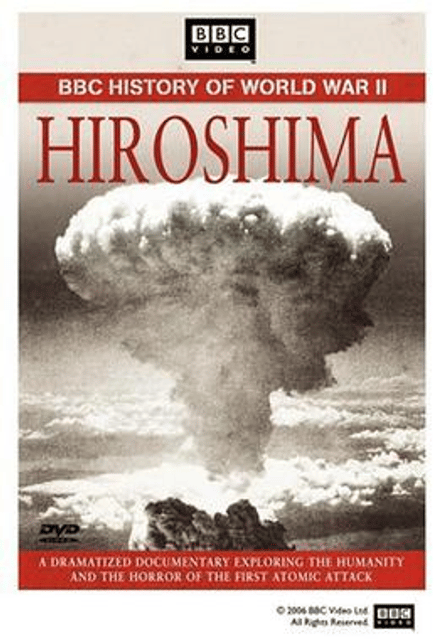Hiroshima: BBC History of World War II

Hiroshima: BBC History of World War II

| Hiroshima: BBC History of World War II | |
|---|---|
| Genre | Documentary History Military |
| Written by | Paul Wilmshurst |
| Directed by | Paul Wilmshurst[1] |
| Narrated by | John Hurt[1] |
| Theme music composer | Daniel Pemberton[1] |
| Country of origin | United Kingdom |
| Originallanguage(s) | English |
| Production | |
| Producer(s) | Paul Wilmshurst |
| Editor(s) | Luke Dunkley Horacio Queiro[1] |
| Running time | 89 minutes[2] |
| Release | |
| Original network | BBC One BBC America Discovery Channel |
| Original release |
|
Hiroshima is a BBC docudrama that premiered as a television special on 5 August 2005, marking the eve of the 60th anniversary of the atomic bombing of Hiroshima.[1] The program was aired on the Discovery Channel and BBC America in the United States. The documentary features historical reenactments using firsthand eyewitness accounts and computer-generated imagery of the explosion. The film won an Emmy and three BAFTA awards in 2006.[3]
| Hiroshima: BBC History of World War II | |
|---|---|
| Genre | Documentary History Military |
| Written by | Paul Wilmshurst |
| Directed by | Paul Wilmshurst[1] |
| Narrated by | John Hurt[1] |
| Theme music composer | Daniel Pemberton[1] |
| Country of origin | United Kingdom |
| Originallanguage(s) | English |
| Production | |
| Producer(s) | Paul Wilmshurst |
| Editor(s) | Luke Dunkley Horacio Queiro[1] |
| Running time | 89 minutes[2] |
| Release | |
| Original network | BBC One BBC America Discovery Channel |
| Original release |
|
Summary
The documentary recounts the world's first nuclear attack and examines the repercussions. Covering a three-week period from the Trinity test to the atomic bombing of Hiroshima, the program chronicles America's political gamble and the planning for the momentous event. Archival film, dramatizations, and special effects depict what occurred aboard the Enola Gay and inside the nuclear blast.[2]
Eyewitness interviews
Five Japanese survivors are interviewed: Kinuko Laskey (a nurse in a communications hospital), Morio Ozaki (an army cadet), Toruko Fujii (16-year-old tram driver), Thomas Takashi Tanemori (an eight-year-old schoolboy), Dr. Shuntaro Hida (a doctor at a military hospital), and Akiko Takakura (a 17-year-old city bank clerk).
From the United States the interviewees are Paul Tibbets (the commanding officer and pilot of the Enola Gay), Theodore Van Kirk (the navigator of the aircraft), Morris R. Jeppson (the weapon test officer), and Russell Gackenbach (the navigator of the accompanying photographic aircraft Necessary Evil). White House Map Room Duty Officer George Elsey is interviewed as an eyewitness to the Potsdam Conference.
Alternate titles
Hiroshima
Hiroshima: BBC History of World War II
Hiroshima: The First Weapon of Mass Destruction
See also
Hibakusha
Paul Tibbets
White Light/Black Rain: The Destruction of Hiroshima and Nagasaki